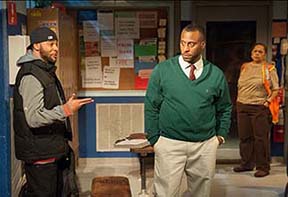
Lucy Komisar
|
“Skeleton Crew” Written by Dominique Morisseau, directed by
Ruben Santiago-Hudson. That of course was the year that bankster fraud almost brought down the world financial system and caused business failures that threw millions of people out of work.
In this Detroit stamping plant that makes part for cars, four workers, all black, confront losing their jobs: there are rumors the plant will close. Their lives are very different, but this draws them together. They don’t have many other options. Faye (Lynda Gravatt), an overweight middle-aged force of nature, arrives in the bare bones canteen [not the upscale digs the bosses set up for themselves], stares at a “no smoking” sign and lights up. She has been at the plant for 29 years. Dez (Jason Dirden), a worker about 30, would leave the place as fast as he could. Faye, the United Auto Workers rep, tells him what the union did for him. He has a job he couldn’t have had before. Shanita (Nikiya Mathis) is single and pregnant and thinking about baby names. Dez tells her that the kid won’t be able to get a job. Well, even people with jobs don’t have things so great. Faye is a cancer survivor; she’s paid out everything for medical care. Her home was lost to taxes and she lives surreptitiously in the plant. Hello 21st century capitalism.
.They are watching the plant turn into a ghost town. Reggie (Wendell B. Franklin) the supervisor says the company will be firing people within the year. Reggie dropped out of high school, so this job has been his savior. He just bought a house. His daughter will go to college. Or now maybe not. He does everything according to the rules. He posts no smoking, no gambling signs. But for all he works for the system, the system won’t work for him. Or the others. He wants Faye to help soften the blow for the rest. He’s not telling them what is about to happen, because he needs to protect his wife and kids. One assumes the company doesn’t want the workers to immediately look for other jobs. Faye tells him, “Do something to protect the workers.” Director Ruben Santiago-Hudson, with dancer/choreographer Adesola Osakalumi, smartly shows what the work is really like. A robotic figure moves in the background to the rhythm of “eat, work, sleep, repeat.” And of course Santiago-Hudson imbues the workers with a humanity their bosses obviously lack. The actors are a fine ensemble that pull you so far into Morisseau’s world that you seem to live the characters’ lives. Meanwhile, the plant is being ripped off, materials taken. Is that a desperate sabotage? By whom? The bosses are looking for reasons to fire people. The irony is how what the bosses think about the workers (zero) compares to how the workers think about the plant. Shanta loves feeling important at a job building something, a car. She doesn’t want to work at another option, a copy center. Being in a highly skilled job makes her proud. Reggie is suspicious of Dez and orders him to open his locker. Dez has his head in the clouds but we don’t think he’s a crook. It’s a red herring. There’s never any evidence. It turns out he’s a caring guy.
The real criminals are those who represent the corporate cruelty. In the end, each of the workers, including Reggie, shows a humanity
and willingness to sacrifice that distinguishes them from their bosses.
It’s a play for our times. |
| museums | NYTW mail | recordings | coupons | publications | classified |



